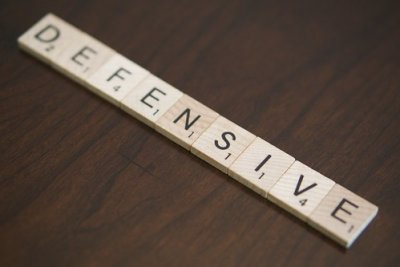9 Ways Defensiveness is Ruining Your Relationships

By: Sharon Sinclair
by Andrea M. Darcy
Does your partner or friend keep saying, ‘you are so defensive’? Which just makes you feel, well… like you need to defend yourself? It might be time to consider how defensiveness is damaging your relationships.
How Defensiveness Ruins Your Relationships
How exactly does defensiveness ruin relationships?
1. It makes you a very bad listener.
When we are defensive, our mind is completely preoccupied with proving our ‘innocence’ and being ‘right’.
Proper listening isn’t just about being quiet when the other speaks. It means you put your attention fully on the other person and what they are saying. You aren’t planning what to say next, and are open to other perspectives.
If you aren’t really listening, the other person quickly senses it. Leading to the next problem.
2. It stops connection.

photo by: Slava
Other people get tired of hitting their head against the brick wall of your defensiveness.
With time, they just start agreeing for the sake of agreeing, or they, too, get defensive. As communication expert William H. Baker points out in his paper “Defensiveness In Communication: Its Causes, Effects, and Cures“–
“Defensiveness becomes a phenomenon readily observable by others and they, sensing defensiveness, often react in a like manner. The communicators thus become involved in a destructive, self-perpetuating cycle.”
And this means that you are not connecting. Connection means creating a safe space for each of you to be fully yourselves without fear of judgement, and to be seen and heard. Defensiveness, on the other hand, is all about judging the other to protect yourself.
3. Your need to be right can come across as smug.
At the heart of defensiveness is the need to be ‘right’. Deep down we might have unconscious beliefs, generally from childhood, that we are ‘wrong’ or ‘bad’ or ‘not good enough’. Defensiveness is our endless attempt to change this.
The idea of a ‘right and wrong’ world is all fine when we are five years-old and being taught how to be responsible by our parents. Now here we are, adults. The world is not really so black and white. There is not one option or one perspective, there are several. If you refuse to try to see other’s perspectives you don’t come across as right but condescending.
4. You are blocking chances for growth and evolution.
Relationships don’t grow and mature because we do everything right. But because we make mistakes, recognise our mistakes, then together find way to troubleshoot and move forward.
If you are always defensive, then this process never gets off the ground. Your relationship remains stuck at a certain level.
Defensiveness is such a serious barrier to learning that American research on business training suggests it is a ‘persistent concern’ in the learning of management skills and in navigating good manager employee relationships.
5. It means your relationships are generally immature.
 On the surface it might seem fine. But without evolution via healthy conflict, it’s not going to be a powerful adult relationship.
On the surface it might seem fine. But without evolution via healthy conflict, it’s not going to be a powerful adult relationship.
6. You are throwing away your personal power and agency.
Always feel ‘put upon’? Others are always ‘doing you wrong’? You are playing the victim.
And the trouble with victim mentality is that to be a victim, you have to act like you are powerless. You can’t then put your inner resources towards progressive action.
Yes, as children, we are victims. We have to put up with what is in front of us. As adults, we have choices and need take responsibility for what is happening to us, even if it’s just recognising we decided to stay in a bad situation or be silent when something started going wrong.
7. People eventually do give up on you and leave you lonely.
If you don’t drop your defensiveness, people back off and can, eventually, leave.
Famous relationship and marriage therapists, Dr. John and Julie Gottman, see defensiveness as so destructive it’s one of what they call the “four horsemen of the apocalypse”. Alongside criticism, contempt, and stonewalling, it heralds the end of a relationship.
8. You can start to lose your own identity and self-respect.
Defence mechanisms are essentially ingrained habits. And habits can be hard to break, even if we know they are not a good thing and we want to stop.
Yes, you can go to your friends and tell the latest story of how yet again someone ‘did you wrong’. But a little voice in your head will be asking, ‘is that even true’? As part of you knows the story isn’t that simple. That despite all your endless defensiveness, you weren’t always right or perfect after all.
You can start to feel divided into two people. The you you mean to be, and the one shouting at everyone else. It can be increasingly hard to feel good about yourself.
9. It leads to bad parenting.
Defensiveness is bad enough in our adult relationships. Defensiveness in parenting is toxic. It teaches children a black/white perspective of the world, and to make others wrong without listening. It forces them to take sides with one parent over the other. And in the long run it can mean they are scared of you, or afraid to turn to you when they need you most.
Has all of the above left you feeling angry?
Has reading this made you feel defensive? Then there is a problem. And it’s time to look at what your defensiveness is all about.
Defence mechanisms help us when we are children. They mean we can make sense of and navigate a childhood trauma or difficult experiences.
Research shows, for example, that defensiveness is connected to attachment issues, where we didn’t get the unconditional support and protection that children need to thrive.
A study on adult attachment patterns and quality of apologies showed that avoidant attachment led participants to “seek to protect themselves with defensive strategies, such as justifications and excuses”.
As adults we need to accept that our defence mechanisms no longer work. Working with a therapist can help us learn the tools to overcome defensiveness at last, such as the solutions suggested by William H.Baker of “empathy, treatment of fellow communicators as equals, and genuineness.”
Time to face the past instead of defending yourself against pain? We connect you with top London therapists who can help. Or use our booking site to find a UK-wide registered therapist or online therapy you can access from anywhere.
Still have a question about defensiveness? Post below. Note that all comments are moderated.
 Andrea M. Darcy has worked as a writer since she left university. After years of making it as a professional screenwriter, she retrained and now writes psychology and personal development content. Find her on Instagram @am_darcy.
Andrea M. Darcy has worked as a writer since she left university. After years of making it as a professional screenwriter, she retrained and now writes psychology and personal development content. Find her on Instagram @am_darcy.





Oh my god, I was reading about me and the best bit was “Is reading this making you defensive?”
However, it makes me feel so sad that in my 50’s I am only just realising that all my issues in life have titles and with those titles come “Coping Mechanisms” which I have never learnt because I did not know I had a title.
Of course all those around me saw me as a drama queen, emotional mess, highly strung but the truth of the matter is, I didn’t and still do not know how to articulate my self in a grown up way. I am still that child who is frightened to say exactly what I mean, for fear of repercussion, so I scream, shout and cry, feeling totally walked all over, angry and with the issue/s still unresolved,
I must now stop as I am going on, but thank you for this article, thank you very much.
Hi Sally-Ann, we are so glad it’s helped. Cut yourself some slack, coping mechanisms happen because we are doing the best we can. And you are here, reading this article, which means you are on the road forward. Don’t overlook the power of proper support, counselling and therapy can make huge differences with things like coping mechanisms, and we have clients who start therapy for the first time in their seventies! Best, HT
I have defense issues and need help but I don’t have insurance
Soo glad I found this article!! It validates every single thought about my boyfriend except for the last item #9. He treats his kids with utmost respect and gentleness. Opposite of how he is towards me.
It’s been 5 years of the never-ending cycle of repeated wrongs and arguments which never seem to change or get any better.
And most importantly the inability to listen or learn from past mistakes. Never accountable. Which tells me it’s a losing battle. The sad truth of it all.